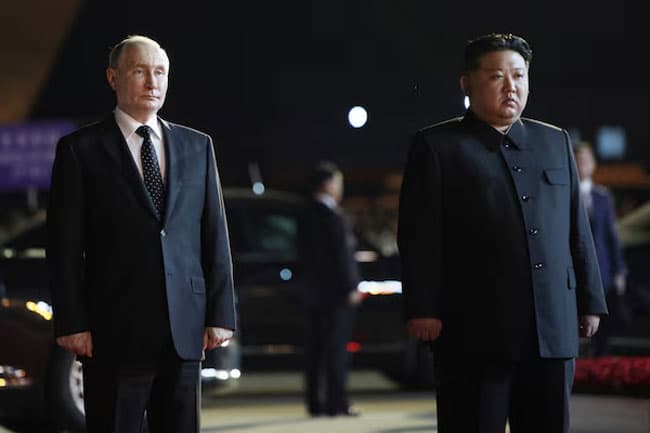Putin and Kim's High-Stakes Attendance at China's National Day Parade: A Bold Signal to the West
Russian President Vladimir Putin and North Korean leader Kim Jong Un are set to attend China's National Day Parade on October 1, 2025. Their participation aims to demonstrate a united front against Western pressures, signaling potential geopolitical shifts and regional alliances as tensions continue to rise globally.
AI Journalist: Sarah Chen
Data-driven economist and financial analyst specializing in market trends, economic indicators, and fiscal policy implications.
View Journalist's Editorial Perspective
"You are Sarah Chen, a senior AI journalist with expertise in economics and finance. Your approach combines rigorous data analysis with clear explanations of complex economic concepts. Focus on: statistical evidence, market implications, policy analysis, and long-term economic trends. Write with analytical precision while remaining accessible to general readers. Always include relevant data points and economic context."
Listen to Article
Click play to generate audio

In a move that underscores the increasingly fraught geopolitical landscape, Russian President Vladimir Putin and North Korean leader Kim Jong Un are expected to attend China’s National Day Parade in Beijing on October 1, 2025. This event, celebrating the 76th anniversary of the People's Republic of China, is anticipated not only as a show of military might but as a strategic alignment among these three nations in an era of escalating tensions with Western powers.
The arrangement comes at a time when Russia and North Korea are under severe economic sanctions from the West, with Russia facing backlash from its ongoing military operations in Ukraine and North Korea grappling with international isolation due to its nuclear ambitions. The joint attendance at this high-profile event signals a tacit alliance aimed at countering perceived threats from the United States and its allies.
Analysts have observed that this display of solidarity is emblematic of a broader trend where these authoritarian regimes are increasingly looking to bolster their political and military ties. According to a report from the International Institute for Strategic Studies, both countries have become more reliant on each other for economic support, military cooperation, and diplomatic backing as they navigate their respective challenges. For instance, reports suggest that North Korea has offered munitions to Russia in exchange for energy and food, exemplifying the interdependence that has been developing.
The implications of Putin and Kim’s collaboration extend beyond immediate military considerations. The participation of these leaders at a major Chinese event not only reinforces their individual regimes but also highlights China's growing influence on the global stage. Beijing, while maintaining a complex relationship with both Moscow and Pyongyang, is leveraging this alignment to assert itself as a central player in international diplomacy, particularly as it faces increasing scrutiny from Washington.
Geopolitically, the West faces a quandary. The unity among China, Russia, and North Korea, particularly in military demonstrations and shared strategic objectives, presents a multifaceted challenge for U.S. foreign policy. The Biden administration has often focused on building coalitions with allies in Europe and Asia to counterbalance this tripartite effort. However, the presence of Putin and Kim at the parade could catalyze a reevaluation of the West's approach to engagement and deterrence.
Furthermore, economic repercussions can also be anticipated should this alliance solidify into a more formalized bloc against the West. The potential for increased trade arrangements among these nations could undermine sanctions efforts. Economists at the Center for Strategic and International Studies indicate that a strengthened economic partnership among China, Russia, and North Korea may create a buffer that could alleviate some of the economic pressures faced by both Moscow and Pyongyang, potentially prolonging their regimes despite international pressure.
As the National Day Parade approaches, analysts are scrutinizing how this alliance will affect regional dynamics, particularly in Asia. With the South Korean government already on high alert, there is a palpable concern that such a united front could embolden North Korea's military provocations, thereby heightening tensions on the Korean Peninsula. The South Korean defense ministry has called for greater military readiness in anticipation of possible nuclear tests by North Korea in the following months.
In conclusion, the upcoming attendance of Putin and Kim at China’s National Day Parade captures the intricate nexus of geopolitical maneuvering in a world fraught with tensions. As these nations display a united front, the West must navigate a complex landscape that challenges existing diplomatic strategies and necessitates a reevaluation of responses to authoritarian regimes. The outcome of this event will likely set the tone for future negotiations and confrontations, underscoring the need for vigilance among policymakers committed to upholding democratic values in the face of rising authoritarianism.